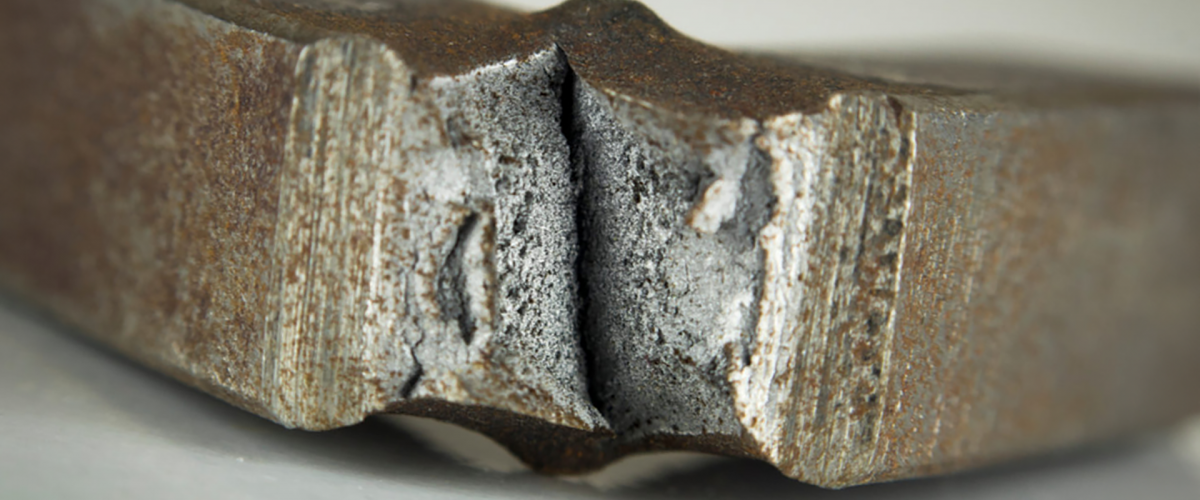Pendulum impact testers are tools in material testing, used to determine the impact strength or toughness of a material under impact loading by determining the amount of energy that can be absorbed by the material. This provides insights into its durability and safety under sudden stress or impact. This type of testing is necessary in industries where materials are expected to withstand harsh, impact-heavy environments, making it an invaluable part of both research and development phases and quality control processes.
Among the different types of pendulum impact testers – Charpy, Izod, Drop Weight, Dynamic Tear, and High-Energy Impact – the Charpy and Izod models are notably predominant. These two types of tests are particularly valued for their efficiency and specificity in measuring materials’ impact energy and toughness. As we are going through 2024, Charpy and Izod testers are becoming increasingly popular due to their increased precision testing capabilities. Their growing preference is a result of advances that allow for more detailed and reliable analysis, vital for developing safer and more robust materials.
As part of this article, we will introduce you to the most advanced pendulum impact testing systems from NextGen Material Testing Inc., which have become market leaders in the impact testing segment in 2024. As a leading company in the material testing industry, particularly in the development of testing equipment, we offer an extensive selection of advanced systems.
Our focus today will be completely on the Charpy and Izod systems. In addition, we will explore what constitutes a Charpy test and an Izod test, discuss the distinctions between these two testing methods, and provide insights into their most common applications.
Understanding Charpy and Izod Impact Tests
Charpy and Izod tests are two distinct methodologies used within material testing to assess materials’ impact toughness. These tests are valuable in determining how materials behave under sudden impact conditions, a critical factor in industries where material failure can lead to significant consequences. While both tests aim to measure similar properties, they are applied in different contexts and setups, each providing unique insights into material characteristics. Our next step will be to explore in greater detail each of these testing methods, including their applications and differences between each one.
The Charpy Impact Test Explained
The Charpy impact test, also known as the Charpy V-notch test, is a method used to assess the notch toughness of a material – in other words, its ability to withstand sudden impacts or stress. This test is extremely important for industries that require materials to perform under abrupt forces.
The Charpy test involves striking a notched specimen of material with a pendulum hammer and measuring the energy absorbed in the fracture. The presence of a notch is crucial as it focuses the impact on a specific point, which helps in assessing the material’s fracture characteristics under controlled conditions. This setup allows for quick and economical data gathering.
One of the primary advantages of the Charpy test is its ability to provide both quantitative and qualitative insights into a material’s properties. Quantitatively, it measures the energy required to fracture the material, which is directly related to its toughness. This measurement can reveal the material’s behavior under different conditions, including its ductile-brittle transition temperature – a point at which fracture behavior shifts dramatically.
Qualitatively, the test indicates material ductility. A brittle fracture typically results in a flat plane, whereas a ductile fracture shows jagged edges or shear lips. By analyzing the fracture surface, engineers can estimate the proportion of ductile versus brittle fracture.
The Charpy test is standardized under standards like ASTM E23 and ISO 148-1, making sure the test conditions are consistent and the results are reliable in different settings. These standards specify the dimensions of the test specimens and the geometry of the notch, which are critical for accurate results.
Explanation of the Izod Impact Test
The Izod impact test measures how much energy a material can absorb under sudden impact, which is a factor in determining its toughness and suitability for a particular application.
In an Izod impact test, a pivoting arm is raised to a specific height to maintain constant potential energy and then released to swing down and strike a notched sample mounted in a vertical position. The point of the test is to break the specimen, measuring the energy absorbed by the material by noting the height the arm reaches after impact. The notched configuration of the sample helps in assessing both the impact energy and the material’s sensitivity to notches, providing a clear picture of its behavior under sudden stresses.
Several variables affect the results of an Izod impact test, making it necessary to standardize conditions to compare different materials effectively. These include the dimensions and geometry of the sample, the height and mass of the hammer, and the sharpness of the notch. Furthermore, environmental conditions like the temperature of the sample at the time of the test can significantly influence the results, as materials may exhibit different properties at various temperatures.
The ASTM D256 standard governs the Izod impact test for plastics, indicating the energy lost per unit of sample thickness at the notch. This method allows for a uniform approach to testing different materials. The test results help in determining a material’s ductile-to-brittle transition temperature, which is essential for applications where a material must perform under a range of temperatures.
The Best Pendulum Impact Testers for Charpy And Izod Tests
NextGen Material Testing Inc. offers a comprehensive line of pendulum impact testers specifically designed to conduct both Charpy and Izod tests with exceptional precision and reliability. Our equipment range covers capabilities from 1 Joule (J) to 750 Joules (J). We will tell about the features and specifications of our four leading pendulum impact testers: Class J, Class D, Class G, and Class H. Each model is engineered to meet distinct testing needs. Lets review these state-of-the-art Charpy and Izod impact testers in greater detail.
Class J – Charpy and Izod Automatic Impact Testing System
Among NextGen Material Testing Inc.’s lineup, the Class J Charpy and Izod Automatic Impact Testing System stands out as the most compact yet flexible tester catering to the plastics and rubber industries. This system operates within an energy range from 1 Joule (J) to 50 Joules (J) for Charpy tests and 1 Joule (J) to 22 Joules (J) for Izod tests, making it the smallest range in our tester line. Despite its small size, Class J does not compromise on functionality and offers comprehensive testing capabilities.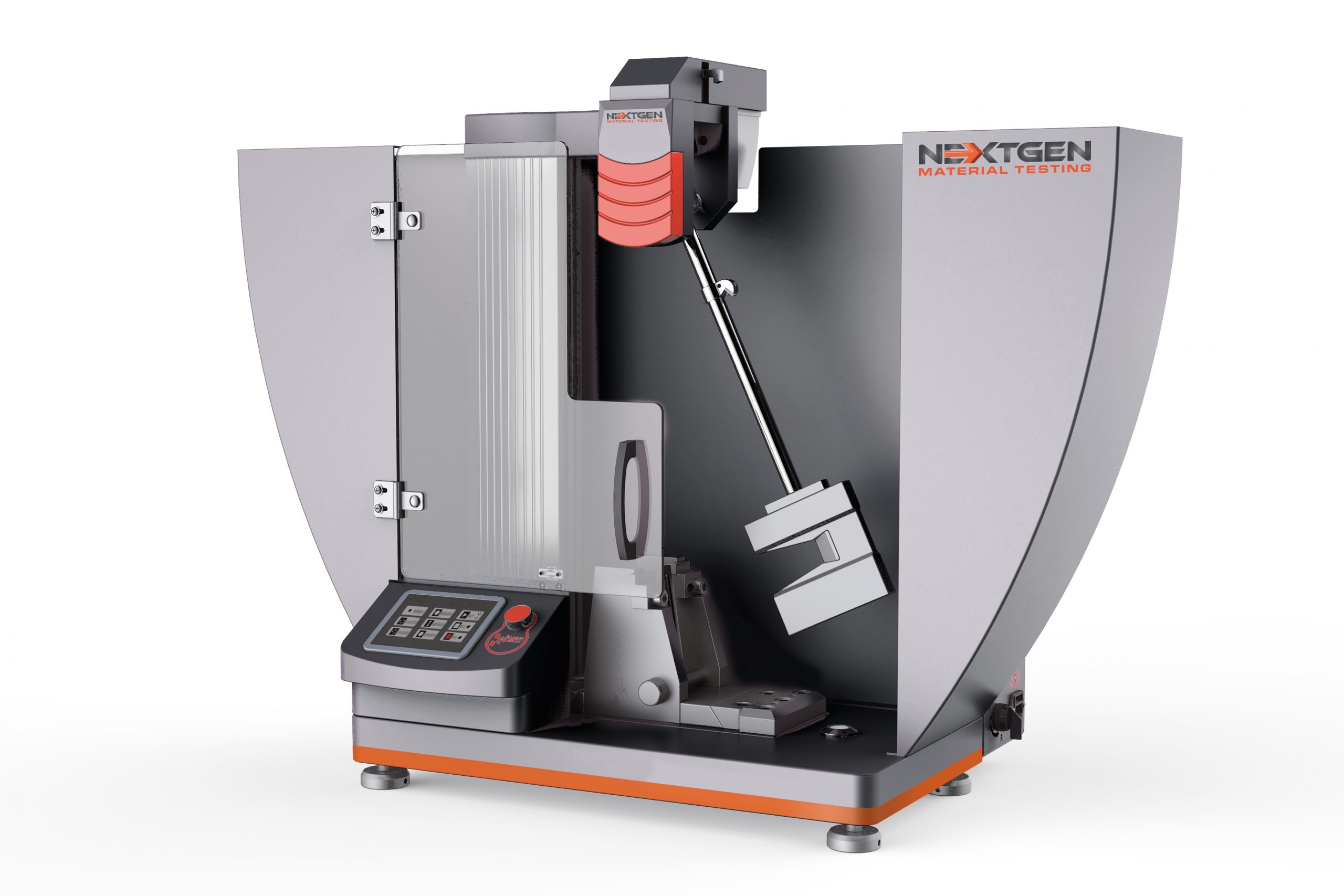
High Precision and Minimal Energy Loss: Class J uses a high-resolution, shaftless encoder for angle measurement, providing a precision of 0.045 degrees. This technology not only increases measurement accuracy but also minimizes energy losses due to its frictionless rotation.
Intuitive Operation: The Class J tester is equipped with a user-friendly touchscreen display that simplifies setup. Operators can easily input specimen dimensions, select pendulum energy, and choose units. The touch screen also intuitively displays test results, such as absorbed energy and impact toughness, allowing immediate analysis.
Versatility in Testing: One of the system’s notable features is its interchangeable pendulum, which can be easily switched to accommodate Charpy, Izod, and tensile impact tests. This flexibility makes Class J an ideal choice for impact testing labs.
Efficient Specimen Alignment and Support: The rotating tester design facilitates quick and precise center alignment of specimens for Charpy tests. Additionally, the supports are designed for easy handling. They are firmly tightened and only require two bolts to change, thus improving system operational efficiency.
Future-Proof Design: Despite its current capabilities, the Class J system is built with future expansion in mind. Its single-column structure not only provides ample testing space but also allows for the easy installation of accessories for low-temperature impact tests.
Class D – Dual Column Charpy Impact Tester
The Class D Metals Impact Tester represents a robust and advanced solution for Charpy impact testing. This system is ideally well-suited to high-energy testing scenarios, offering configurations ranging from 150 Joules (J) to 750 Joules (J).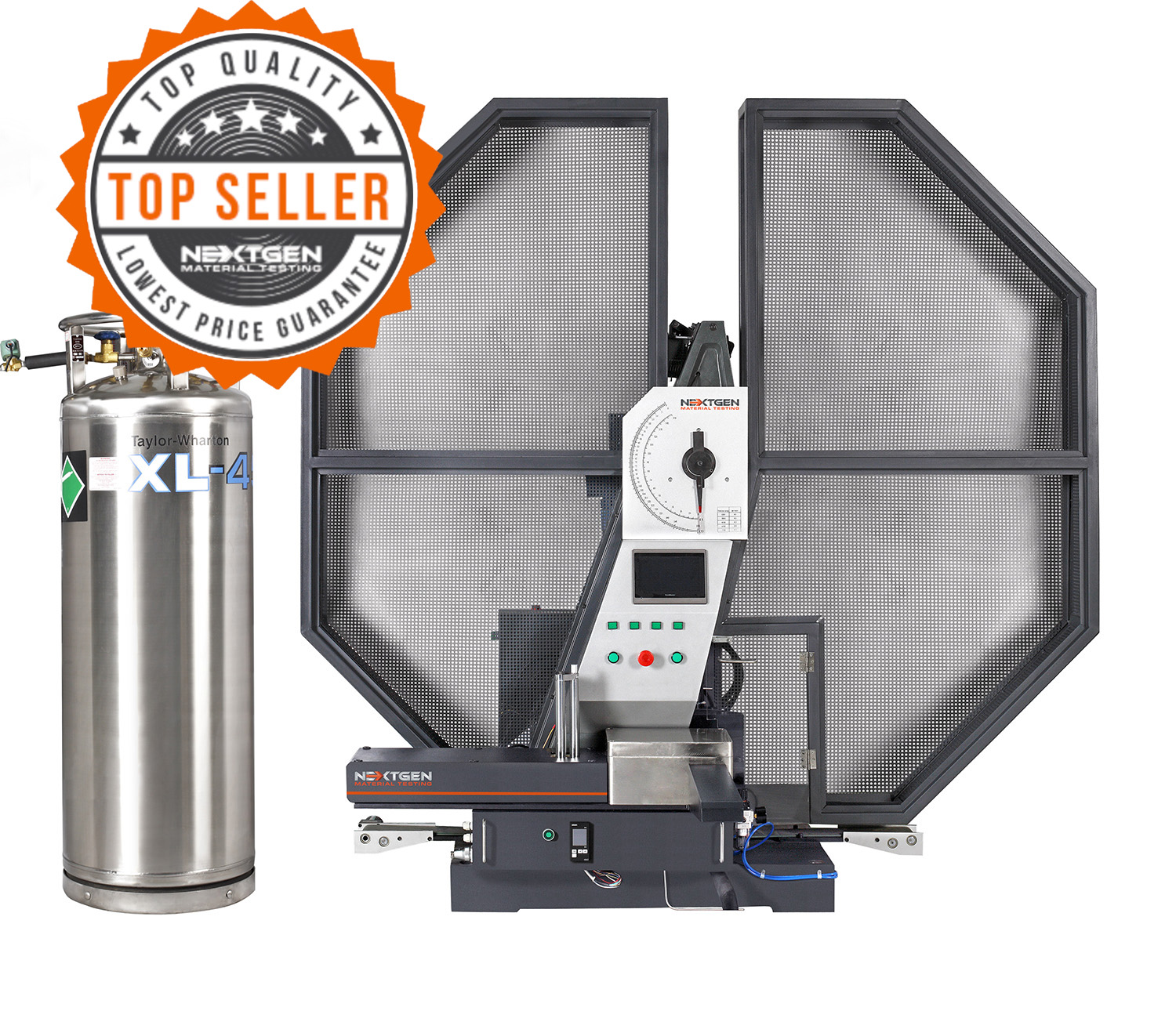
Dual Column Stability: The Class D system features a dual-column impact frame that increases its structural integrity and support, allowing it to handle high-energy impacts without vibrations that could skew results. This design is critical for maintaining consistent and reliable testing outcomes, particularly in environments that require the absorption of significant impact energies such as steel production, aerospace, and heat treatment facilities.
Versatile Energy Capacity: With available impact energies of 150J, 300J, 450J, 600J, and 750J, Class D is designed to support the full spectrum of material testing applications. The 450J model is commonly utilized in educational settings, R&D labs, and government facilities, whereas the 750J model is preferred in high-demand industrial environments due to its capacity to handle rigorous testing of robust materials.
Enhanced User Interface and Safety Features: Class D is equipped with a standard touchscreen display, improving user interaction and simplifying impact test setup and execution. The fully enclosed testing area ensures the highest level of safety during operation, protecting users from debris and other hazards associated with high-energy impacts. The system also features an electromagnet for secure pendulum locking, further augmenting its safety protocols.
High Precision and Connectivity: The system includes an analog and digital readout for precise measurement, with options to connect to a PC for detailed analysis via proprietary software. This connectivity allows for more in-depth data analysis and record-keeping, making Class D an intelligent choice for facilities that prioritize data-driven decision-making.
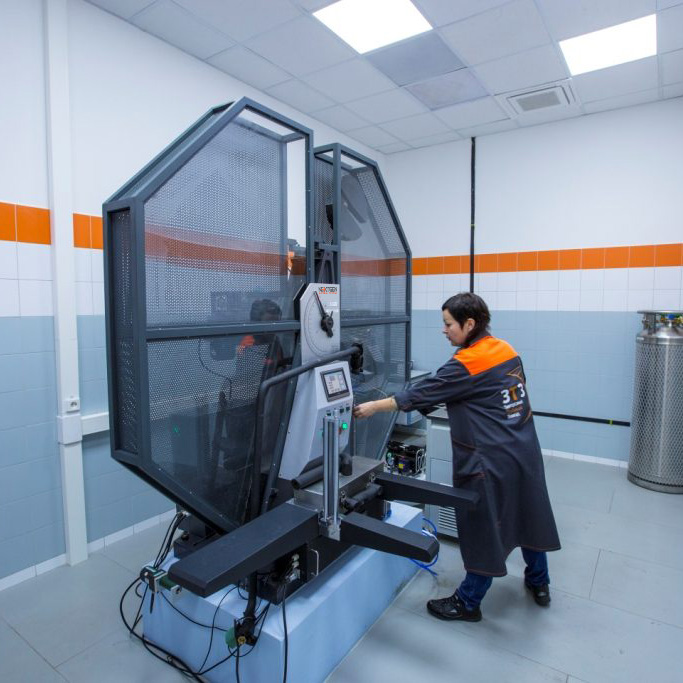
Class G – Servo-Motor Single Column Charpy/Izod Impact Tester
The Class G Metals Impact Tester is a single-column impact testing system engineered for precision and adaptability. It supports Charpy and Izod impact tests according to comply with industry standards including ASTM E23, ASTM E1820, ASTM E2298, ISO 148, and EN10045. Designed to handle peak capacities of 450J, with optional configurations of 150J and 300J, the tester can handle a wide spectrum of impact tests.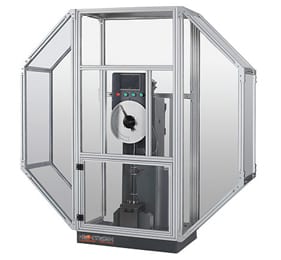
High Precision Impact Testing: Class G is built with a heavy cast iron base and a single-column frame that provides stability and minimizes vibrations during tests, maintaining results integrity. It has a servo motor that enables precise control of the movement of the pendulum due to its servo motor.
User-Friendly Interface and Safety Features: Equipped with a touchscreen display, Class G offers an intuitive interface for setting up tests and viewing results. It is also designed for safety, featuring a fully enclosed testing area and an electromagnet that securely locks the pendulum in place.
Connectivity and Data Analysis: The impact tester provides options for connecting to a PC for software analysis, allowing for more thorough data examination and storage. Digital and analog readouts ensure high-accuracy results, which are critical for detailed materials characterization.
Instrumented Impact Testing: Class G can be equipped with a force transducer integrated within the pendulum, transforming it into an instrumented impact tester. This advanced feature enables the capture of detailed data on characteristic force, energy, and displacement parameters. These parameters include pre-maximum force energy, post-maximum force energy, and the forces at various critical points in the material’s deformation and fracture process.
Class H – Servo-Motor Dual Column Charpy Impact Tester
The Class H Metals Impact Tester represents robustness and precision in material testing. This dual-column impact testing system is specifically designed for Charpy impact testing, meeting the requirements of international standards such as ASTM E23, ASTM E1820, ASTM E2298, ISO 148, and EN10045. Designed to handle extreme testing requirements, Class H is the ideal choice for high-volume testing of particularly hard materials, providing peak capacities ranging from 300J to 750J.
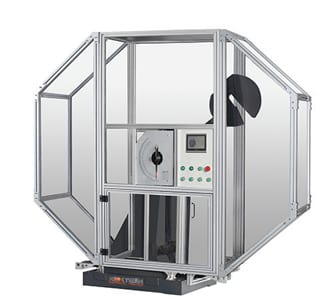 Robust Design for High-Energy Impacts: Class H’s heavy cast iron base and dual-column frame are engineered to eliminate vibrations during impact tests, providing consistent and dependable results.
Robust Design for High-Energy Impacts: Class H’s heavy cast iron base and dual-column frame are engineered to eliminate vibrations during impact tests, providing consistent and dependable results.
High Capacity and Versatility: With optional pendulums available for 300J, 450J, 600J, and 750J, Class H is versatile enough to accommodate a wide range of materials and testing scenarios. This adaptability makes it suitable for industries like aerospace, automotive manufacturing, and metallurgical engineering where materials undergo extreme stresses.
Operational Ease and Connectivity: The system includes a standard touchscreen display for easy setup and operation, improving the user experience with intuitive interfaces and automated processes. For labs looking to integrate more advanced data collection and analysis, Class H offers connectivity options for use with PCs through specialized software.
Safety and Precision Controls: Safety is of utmost importance with Class H. It features a fully enclosed testing area and an electromagnet to securely lock the pendulum. This setup not only protects the operator during high-energy tests but also guarantees that the testing process is not interrupted by external factors. The precision of the pendulum’s height and weight further contribute to each test’s accuracy.
Applications of Charpy and Izod Impact Testers
Charpy and Izod impact testers are indispensable tools in many industries for evaluating materials’ toughness and durability under impact loading. A material must be able to withstand sudden stresses without catastrophic failure, which is a requirement for maintaining safety and functionality in a number of applications. Below, we explore the specific uses of these testers in different sectors, providing insights into how they contribute to industry standards and product reliability.
Aerospace Industry
Charpy and Izod impact testers assess the toughness of metals used in aircraft frames, turbine blades, and other critical components. For instance, the Class H tester, with its high-energy capacity, is ideally suitable for testing the impact resistance of aerospace materials that must endure extreme operational stresses. This provides confidence that materials will not fail under dynamic loads experienced during flight, which could compromise safety and lead to failures.
Automotive Industry
The automotive industry relies on impact testing to evaluate the performance of materials used in car manufacturing. This includes safety-critical areas such as bumpers, chassis, and door beams. Ability to absorb energy efficiently during collisions is crucial for passenger safety. Testers like Class G are used for Izod and Charpy tests on automotive parts to verify that they meet high safety standards set by automotive regulatory bodies. The data obtained helps engineers design vehicles that meet but exceed safety standards, thereby providing greater protection for passengers.
Construction and Infrastructure
Impact testers are invaluable in the construction and infrastructure industry, where materials such as steel rebar, beams, and columns must be tested for their toughness. For example, Charpy tests are used to determine if a batch of steel can withstand environmental impacts once incorporated into buildings or bridges. This is particularly important in colder climates where materials are susceptible to brittle fractures due to low temperatures. The Class D tester, capable of delivering up to 750J of energy, is ideal for simulating high-impact conditions, helping to guarantee structure longevity and safety.
Renewable Energy
Materials used in the renewable energy sector, such as those found in wind turbine blades and solar panel frames, must also be tested for impact resistance. Impact testers like Class J, which are suitable for a range of energies and materials, are used to validate the durability of new materials used in renewable energy applications, ensuring they can withstand impacts from wind, debris, and temperature changes.
Education and Research
Educational institutions and research laboratories use impact testers like Class G and Class H to teach material science principles and conduct experiments. These tools allow students and researchers to observe the behavior of different materials under impact and gather data for innovative projects and scientific papers. By understanding how materials dissipate energy and fail under sudden impact, researchers can develop new materials with improved properties for various industrial applications.
The Importance of Reliable Impact Testing Equipment
Reliable equipment is a requirement for accurate material testing results. This is why choosing the right Charpy or Izod pendulum impact tester is crucial. These instruments are necessary for determining the impact resistance and toughness of different materials, and without them, industries such as aerospace, automotive, and construction could not guarantee their safety and effectiveness.
NextGen Material Testing Inc. is your dependable partner in providing cutting-edge systems for Charpy and Izod Impact Testing. Our product range includes the machines discussed in this article – Class J, Class D, Class G, and Class H. We highly recommend you explore these products further on their individual product pages to gain a more detailed understanding of their technical specifications and capabilities.
NextGen Material Testing Inc. is ready to assist you with your material testing needs, including state-of-the-art Charpy and Izod pendulum impact testers. If you have questions or need further information, you can contact us directly or request an online quote. We are here to support you and handle all your material testing requirements, making sure you have the tools necessary to perform rigorous and precise evaluations of materials under impact conditions.
